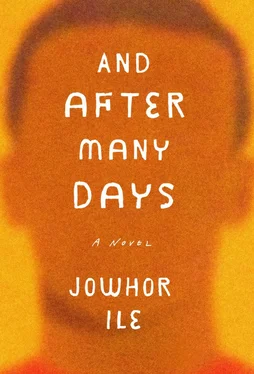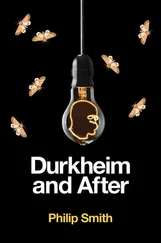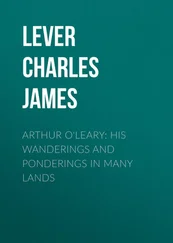Fola was quiet. Ajie wanted him to say something, to discourage his brother. He knew that once Paul jumped, he, too, would have to.
“How do we get back?” Ajie asked.
“We’ll walk all the way around to the gate,” Paul said. He was tapping his foot on a branch, testing its strength to see if it could withstand his takeoff. He must have judged it could: He took off and landed on the other side with a muted thud. “It’s easy!”
Fola went next. He inched forward and misstepped on the branch but held on tight and kept steady for some seconds. His jump was sharp and quick. When he landed, he got up at once and hopped on one foot. Ajie looked beyond the rooftops and slow-moving cars in the distance, all suddenly small as though he were on an airplane. What will it be, then, Ajie thought. He tried to imagine the near future, that evening back in their house, for instance, would it have already happened that he made the jump, feeling proud that he had pushed himself and done it, or would he be nursing his disgrace and cowardice at having chickened out? Would it have happened that he climbed down the tree and walked through the gate to join Paul and Fola on the other side?
“Ajie!” Paul shouted from below. “I’m here, nothing will happen to you.”
Ajie took off without thinking. There was only the slap of wind against his face and nothing else. A quick blur of green, blue, brown. When he landed on the other side, first on his feet, followed by a backward fall on his bottom, Paul pulled him up by the hand.
“Champion. You see, you made it!” Ajie dusted his shorts as they made their way back. Paul dropped a hand on his shoulder.
They walked all the way around to the street, just in time to meet Bibi at Fola’s gate.
“They are looking for you people,” she said, looking only at Paul. “Uncle Gabby is around.” Fola said goodbye and went back into his compound as Paul, Bibi, and Ajie walked back home.
A white van was parked in their driveway. “Is Mr. Ifenwa here, too?” Paul asked.
“Maybe he’s just come. He wasn’t here when I left to find you.”
—
Bendic was in his favorite seat, holding a beer mug in his left hand. “They are back!” he announced to the others. Gabby was sitting next to Bendic; he balanced a bottle of malt drink on his lap. Bendic’s friend Mr. Ifenwa was perched on the edge of his seat, leaning toward a saucer of groundnuts he was shelling and throwing into his mouth.
“Where did you two escape to?” Bendic asked, almost as if addressing the whole room. They greeted him and Mr. Ifenwa, and Paul stood behind their uncle Gabby. Gabby was Ma’s young cousin. He had lived with them once for about a year, while preparing for his O levels, and now that he was in university, he came down sometimes to spend weekends with them.
“I think you have grown taller since the last time I saw you,” Mr. Ifenwa said. “No, I mean you.” He gestured toward Ajie, then emptied the contents of a groundnut pod into his mouth. Not true, Ajie thought. It was Paul who always grew taller. Visitors never failed to comment on it. To Ajie they said things like: So, what class are you in now? Already? Wonderful. What do you want to be when you grow up? A lawyer like your father?
“Lawyers are liars,” Mr. Ifenwa sometimes said. “Let the boy study what he wants, when the time comes.”
“There was a bank robbery near Eleme Junction,” Gabby was saying now. “I heard it on the bus as I was coming.”
“You don’t say,” said Ma.
“The operation lasted a good two hours; the police were nowhere.”
The remote control was resting on the arm of Ma’s chair, and Bibi took it without her noticing, then flipped back and forth between the two channels. She would pause for a few seconds on one and then the other. Ajie saw that Paul was conversing with Gabby in hushed tones. He was trying to get Gabby out of his seat to the dining area, where they could talk freely.
Gabby, the connoisseur of ghost stories. (“Last week, when I was on my way to visit a friend near Wimpey, the taxi driver picked up a woman by the cemetery near Hospital Junction; each time the driver looked in his rearview mirror, he saw a coffin where this woman sat. He would turn his head only to find the woman on her seat, smiling meekly at him. His eyes went up to the rearview mirror, then back to the woman. At the third glance, he stopped the car in panic and ran out, shouting, ‘Jesus! Jesus!’ We looked and the woman had vanished, leaving a white hankie behind.”)
Gabby, master of high farce. (“A heavily pregnant woman was knocked down by a bus as she tried to cross the road at Rumuola. As the car hit her, the child — a boy — evacuated her womb at once and made his way straight into GRA via Presidential Hotel. The police are in full search for him right now, as we speak.”)
A thin, shiny scar ran across Gabby’s scalp, just above his left earlobe, which confirmed him as a man who frequently had dangerous encounters. Gabby had come down to Port Harcourt from the village to sit for his WASC exams. This was in 1984, when the military regime had imposed a nine P.M. curfew. Gabby was walking home from his evening preparatory lessons when the police stopped him. “Come here, who are you, do you have any ID on you, where are you coming from, where are you going,” and Gabby answered these questions, he was only a few minutes’ walk home, there was more than enough time before the curfew began. “Wait here,” one of the policemen ordered, then ignored him until it was nine P.M.
“Are you not aware there is a curfew from nine?” the policeman returned to ask Gabby. “What is it by your time now?” Gabby couldn’t help laughing. Was this man serious? Gabby couldn’t imagine how to react to the scene unfolding before him, so he laughed again as the policeman made a show of the gravity of Gabby’s offense.
“Oh, you are laughing, eh?” the policeman charged. “I will show you today.”
“Just let me go home, I beg you,” Gabby said, gesturing to the nearby street, but the policeman kept him there for another hour and then told him he was being arrested for breaking the curfew. He radioed his colleagues for a van, which they pushed Gabby into. He was being driven to the station for questioning, they said. By the time he was released the next morning, they had somehow managed to break his head in the process of interrogation.
Bibi had joined Paul and Gabby at the dining table. “I can set the tennis board if you like,” Paul said to Gabby. “This time you won’t even get up to ten points before I trash you. I can give you five to start with.” Gabby had beaten Paul at table tennis during his last visit, months ago. “Or do you want ten points to start off with? I can give you that, don’t be afraid. Get up.”
“It’s late,” Ma said, her attention swinging from Bendic’s conversation with Mr. Ifenwa to Paul’s. “Gabby is tired.”
“Tomorrow, Paul,” said Gabby.
“Ohhh,” the children groaned.
“I’m sure Ajie can beat you. Even with his left hand, his loop is something else,” Paul said. “And he stands on a tire to play.”
“That’s because he is a dwarf,” Bibi said.
Even though Ajie didn’t particularly mind that she had said that, he waited for an opportunity in the conversation that would allow him deliver a sharp retort.
Mr. Ifenwa poured his Guinness into a large mug and placed the bottle back on the table with a gentle thud. He clinked glasses with Bendic, who was browsing through a magazine. “Ah, thank you, my sister,” Mr. Ifenwa said to Ma after taking a sip of the cold drink. “This is what someone needs on a day like this.”
Ma smiled and waved him off. “Thank me for what?” she said, as any gracious host would.
Читать дальше
